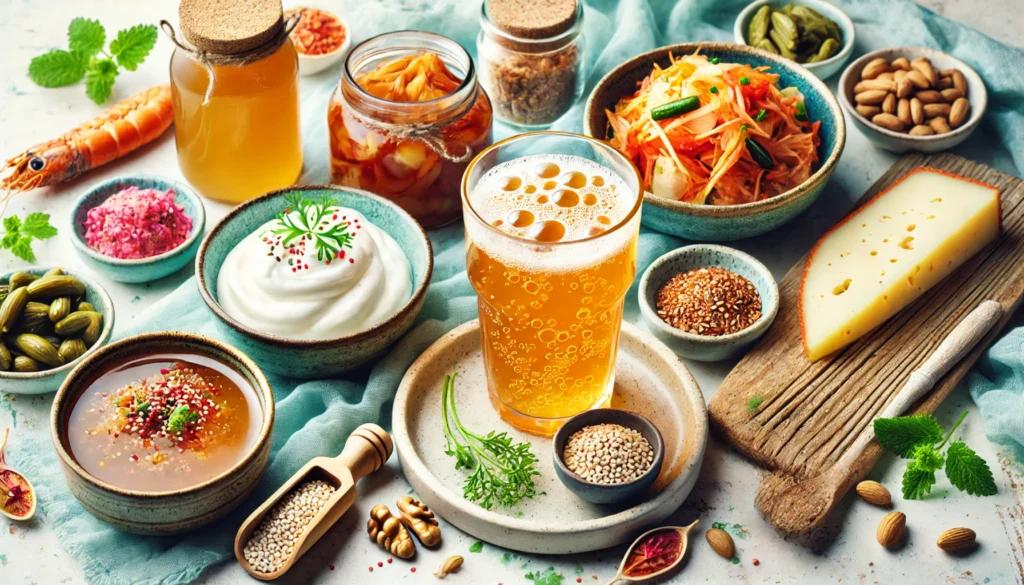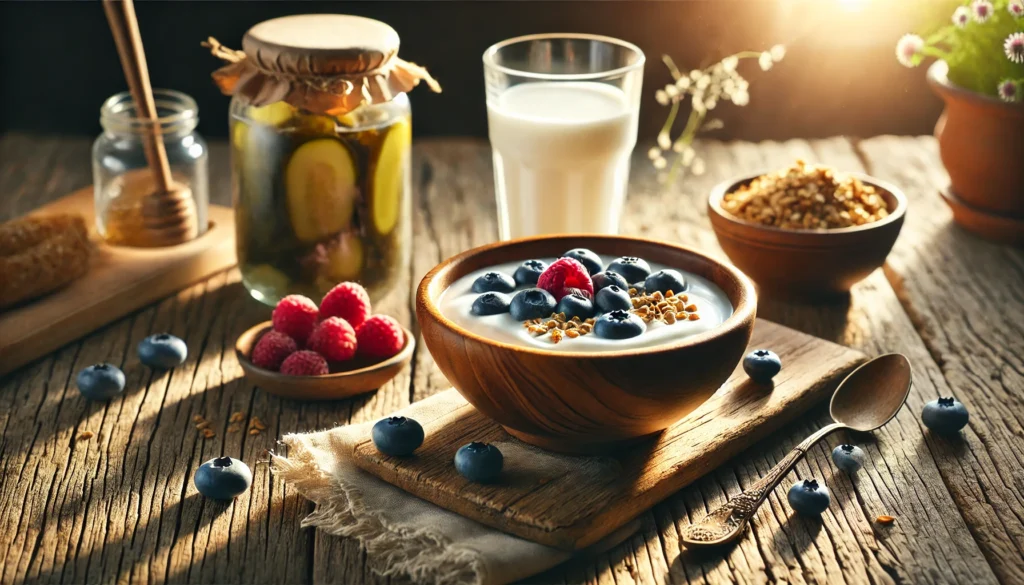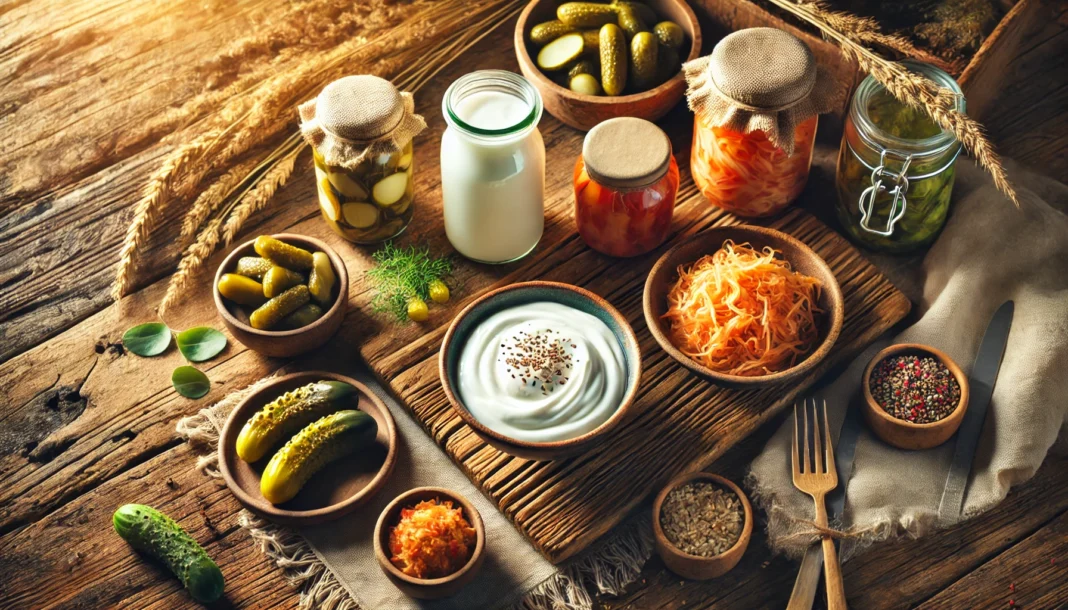Understanding Probiotics and Their Role in Gut Health
The human gut is home to trillions of microorganisms, many of which play a crucial role in maintaining overall health. Among these, probiotics—often referred to as “good bacteria”—are essential in promoting digestive balance, supporting immune function, and even influencing mental well-being. Probiotics are live bacteria and yeasts that provide numerous health benefits when consumed in adequate amounts. They naturally occur in various fermented foods and are also available as dietary supplements. The best natural probiotics not only support digestion but also enhance nutrient absorption, making them integral to a balanced diet.
You may also like: The Ultimate Guide to 6 Major Vitamins: Unlocking the Benefits of Bioavailable Nutrients for Holistic Health
Probiotics contribute to gut health by restoring the natural balance of bacteria in the digestive system. This is particularly important after disturbances caused by antibiotic use, poor diet, or stress, which can lead to an overgrowth of harmful bacteria. Incorporating natural probiotics into daily nutrition helps maintain this balance, ensuring optimal digestive function. Additionally, probiotics produce short-chain fatty acids, which help regulate inflammation and support gut barrier integrity, reducing the likelihood of digestive disorders.

The Science Behind Bioavailable Nutrients in Probiotics
Bioavailability refers to the proportion of a nutrient that is absorbed and utilized by the body. When it comes to probiotics, their effectiveness largely depends on their ability to survive stomach acid, reach the intestines, and colonize effectively. The best natural probiotics not only contain beneficial bacterial strains but also come in forms that maximize their bioavailability. Various factors, including food pairing, digestive enzymes, and the presence of prebiotics, influence the bioavailability of probiotic nutrients.
A key aspect of bioavailable nutrients in probiotics is their ability to enhance the absorption of essential vitamins and minerals. For instance, certain probiotic strains aid in the breakdown of dietary fibers, producing vitamins such as B12 and K2. These vitamins play critical roles in energy metabolism and bone health, further emphasizing the holistic benefits of a probiotic diet. Understanding the bioavailability of probiotics allows consumers to make informed choices about which strains and formulations offer the highest benefits.

Natural Probiotics and Their Dietary Sources
Consuming food with good bacteria is one of the most effective ways to introduce natural probiotics into the diet. Fermented foods, in particular, are rich sources of beneficial bacterial strains that contribute to gut health. Examples of probiotics found in everyday foods include Lactobacillus and Bifidobacterium species, which are commonly present in yogurt, kefir, and sauerkraut. These foods provide a diverse range of probiotics that support various aspects of digestive and immune function.
Yogurt, made from fermented milk, is one of the most widely recognized probiotic foods. It contains live bacterial cultures that help maintain a balanced gut microbiome. Kefir, a fermented dairy drink, offers an even broader spectrum of probiotics due to its fermentation process involving multiple bacterial and yeast strains. Similarly, kimchi, a staple in Korean cuisine, provides a combination of probiotics and bioavailable nutrients, making it an excellent addition to a probiotic diet. Including a variety of probiotic-rich foods ensures a diverse microbiome, promoting overall health and well-being.

The Role of Probiotics in Digestive and Immune Health
Probiotics play a vital role in enhancing digestive health by preventing common gastrointestinal disorders such as bloating, constipation, and diarrhea. They achieve this by producing enzymes that break down food particles, facilitating efficient nutrient absorption. Additionally, probiotics help maintain intestinal barrier integrity, reducing the risk of conditions like leaky gut syndrome, which has been linked to systemic inflammation and autoimmune diseases.
Beyond digestion, probiotics significantly impact immune health by modulating the body’s defense mechanisms. The gut houses approximately 70% of the immune system, making a healthy microbiome essential for immune resilience. Probiotics stimulate the production of antibodies and enhance the activity of immune cells, helping the body fight infections more effectively. Regular consumption of natural probiotics can reduce the frequency of colds, flu, and other infections, making them a valuable component of a holistic wellness strategy.
What Vitamins Do Probiotic Drinks Have?
Probiotic drinks, such as kombucha and fermented dairy beverages, provide more than just beneficial bacteria—they are also rich in essential vitamins. A common question among health-conscious consumers is: what vitamins do probiotic drinks have? The answer depends on the type of drink, the fermentation process, and the bacterial strains involved. However, most probiotic drinks contain a range of B vitamins, including B2 (riboflavin), B6, and B12, which support energy metabolism and neurological function.
Additionally, some probiotic beverages are fortified with vitamin D, which is crucial for bone health and immune function. Fermentation can also enhance the bioavailability of certain minerals, such as calcium and magnesium, making them more readily absorbed by the body. Understanding the nutrient profile of probiotic drinks allows individuals to make informed choices about incorporating them into a balanced diet. Choosing drinks with a diverse range of vitamins and minerals ensures maximum health benefits while supporting gut health.
Where to Get Probiotics: Best Sources for Maximum Benefits
For those looking to incorporate more probiotics into their diet, understanding where to get probiotics is essential. While fermented foods remain a natural and effective source, probiotic supplements offer a convenient alternative for individuals with dietary restrictions or specific health goals. When choosing a probiotic supplement, it is important to consider factors such as strain diversity, colony-forming units (CFUs), and shelf stability.
Health food stores, pharmacies, and online retailers provide a wide selection of probiotic supplements catering to different needs. Some formulations target specific digestive concerns, such as irritable bowel syndrome (IBS), while others focus on immune support or skin health. Consulting a healthcare professional can help determine the most suitable probiotic supplement based on individual health conditions. Regardless of the source, incorporating a variety of probiotics ensures a well-balanced microbiome and long-term health benefits.
Frequently Asked Questions (FAQ) on Advanced Insights into Probiotic Wellness
Q1: How can integrating the best natural probiotics into one’s lifestyle influence mental wellness and overall cognitive function?
Research indicates that a healthy gut can positively affect brain chemistry, and incorporating the best natural probiotics into your daily routine may lead to noticeable improvements in mood and mental clarity. Many individuals on a well-planned probiotic diet experience enhanced focus and stress resilience, which suggests that these supplements contribute far beyond basic digestive health. Exploring diverse examples of probiotics in your nutrition plan can introduce varied bacterial strains that support both cognitive performance and emotional balance. Utilizing modern financial tracking tools to budget for premium supplements can further reinforce your commitment to long-term wellness. Over time, the integration of these practices not only supports mental acuity but also fosters a proactive approach to overall health management.
Q2: What role do natural probiotics play in enhancing overall energy levels, and how can they be incorporated into daily routines?
Many wellness enthusiasts believe that consistent intake of natural probiotics can lead to more balanced energy levels by improving digestion and nutrient assimilation. By integrating these microbial allies into daily routines, individuals often notice an overall uplift in both physical vitality and emotional stability. If you’ve ever pondered what vitamins do probiotic drinks have, exploring the nutritional profiles of various formulations can reveal beneficial micronutrients that further support energy production. It’s also essential to understand where to get probiotics by researching reputable sources that ensure quality and affordability. Combining these approaches with a structured wellness plan can yield enduring benefits that align with both health goals and a sustainable lifestyle.
Q3: Can the integration of best natural probiotics and a comprehensive nutritional plan create sustainable habits for long-term health?
Incorporating best natural probiotics into a daily regimen can be a transformative strategy when combined with a balanced nutritional plan aimed at long-term health. Many people find that this approach not only improves digestive function but also contributes to a greater sense of overall well-being. When assessing your options, it is useful to evaluate what vitamins do probiotic drinks have, as these insights can help refine your nutritional choices. Adding food with good bacteria into your meals introduces a natural way to diversify your gut flora and enhance immune support. This holistic approach—supported by practical habit-forming techniques and mindful spending—can serve as a sustainable investment in your future health.
Q4: What innovative strategies can be adopted to incorporate natural probiotics into a financial budgeting plan for health and wellness?
Innovative strategies often involve integrating natural probiotics into your daily routine while also considering their impact on your overall financial budgeting plan for health. Selecting a well-structured probiotic diet that balances cost with quality can help ensure that your health expenditures are both effective and sustainable. Employing advanced financial tools and budgeting software can further help you track spending and assess value over time. A critical aspect of this strategy is knowing where to get probiotics from reliable, cost-effective sources such as reputable health stores or subscription services. In this way, merging fiscal responsibility with wellness pursuits can create a framework that supports both immediate benefits and long-term financial stability.
Q5: In what ways can best natural probiotics contribute to improved mood stability and emotional resilience, especially during high-stress periods?
Emerging research suggests that best natural probiotics may play a significant role in supporting the gut-brain axis, thereby contributing to enhanced mood stability and emotional resilience. During periods of heightened stress, these supplements can help mitigate physiological stress responses and promote a more balanced emotional state. Many individuals are curious about what vitamins do probiotic drinks have, as discovering drinks enriched with mood-supportive micronutrients can complement traditional stress management strategies. Incorporating varied examples of probiotics into your daily regimen can provide a spectrum of benefits that support both mental and physical health. Ultimately, combining these insights with mindfulness practices may not only stabilize mood but also encourage long-term psychological well-being.
Q6: How can natural probiotics influence digestive efficiency and contribute to a more robust nutrient absorption system?
Natural probiotics are renowned for their ability to enhance digestive efficiency by promoting a balanced and diverse gut flora, which in turn improves nutrient absorption. Integrating food with good bacteria into your daily meals—through fermented foods or specially formulated supplements—can significantly bolster gastrointestinal function. Numerous scientific studies offer compelling examples of probiotics that demonstrate how targeted strains can alleviate digestive discomfort and foster overall gut health. This strategy not only optimizes nutrient uptake but also supports long-term metabolic stability and immune function. Embracing these innovative nutritional approaches can ultimately lead to a more resilient and efficient digestive system.
Q7: What are the long-term financial and health benefits of committing to a probiotic diet, and how can psychological approaches enhance this commitment?
A dedicated probiotic diet has the potential to reduce long-term healthcare costs by improving digestive health and strengthening the immune system, thus decreasing the likelihood of expensive medical interventions. Incorporating best natural probiotics into your daily routine serves as an investment in your future well-being by fostering a balanced internal ecosystem. Regularly consuming food with good bacteria can reinforce these benefits, creating a synergistic effect that extends to both physical and mental health. It is equally important to understand where to get probiotics from credible sources, as this ensures that you receive products that are both high in quality and cost-effective. Psychological strategies like habit formation and mindfulness can further reinforce your commitment, ensuring that both your health and finances thrive over the long term.
Q8: How do advancements in technology and market trends influence natural probiotics’ availability and consumer trust, and what innovations are emerging in the field?
Technological advancements and evolving market trends are reshaping the landscape of natural probiotics, offering consumers greater transparency and access to scientifically validated supplements. Increased interest in nutrition has led many to investigate what vitamins do probiotic drinks have, as modern formulations now often include enhanced nutrient profiles designed for maximum benefit. With a growing array of examples of probiotics available in innovative forms—from capsules to functional beverages—consumers have more choices than ever before. As a result, discerning buyers are more informed about where to get probiotics that meet rigorous quality standards, which bolsters overall consumer trust. These industry innovations are not only redefining product quality but also making advanced probiotic options more accessible and tailored to individual health needs.
Q9: What emerging trends in industry and lifestyle are shaping the future of a probiotic diet, and how can consumers adapt to these changes?
Emerging trends in the health industry are increasingly positioning the probiotic diet as a vital component of holistic wellness and preventive care. Experts emphasize that incorporating best natural probiotics into everyday life is becoming a cornerstone strategy for achieving sustained health benefits. The integration of food with good bacteria into daily routines is a reflection of a broader shift towards natural, nutrient-rich lifestyles that cater to modern health challenges. By exploring diverse examples of probiotics, consumers can tailor their choices to suit evolving scientific insights and personal dietary needs. As these trends continue to develop, staying informed and adaptable will be key for individuals looking to capitalize on the long-term benefits of innovative health practices.
Q10: How can individuals balance the costs associated with natural probiotics and a probiotic diet while ensuring they receive comprehensive nutritional benefits, and what resources can guide them in making informed decisions?
Balancing the costs associated with natural probiotics and a structured probiotic diet requires a thoughtful strategy that emphasizes both fiscal prudence and nutritional efficacy. Evaluating product labels and understanding what vitamins do probiotic drinks have can guide you in selecting supplements that deliver a full spectrum of essential nutrients without undue expense. Integrating food with good bacteria into your meals can often be a more cost-effective way to boost gut health, particularly when sourced from seasonal, whole-food options. Leveraging consumer reviews and expert recommendations helps clarify where to get probiotics that are both reliable and affordable. Ultimately, by combining careful budgeting with informed purchasing decisions, you can secure long-term health benefits while maintaining a sustainable approach to personal finance.
Conclusion: The Lasting Impact of Natural Probiotics on Overall Health
Incorporating the best natural probiotics into daily nutrition offers a multitude of health benefits, from improved digestion and enhanced nutrient absorption to strengthened immune function. The diverse range of probiotic foods and supplements available provides ample opportunities to support gut health naturally. Understanding the science behind probiotics, their bioavailability, and their dietary sources empowers individuals to make informed decisions that align with their wellness goals.
A well-balanced probiotic diet contributes to long-term health by fostering a thriving gut microbiome. By choosing food with good bacteria and exploring different examples of probiotics, individuals can experience improved well-being and vitality. Whether through traditional fermented foods or high-quality supplements, probiotics remain an invaluable component of a holistic approach to health and nutrition.
probiotics for gut health, probiotic supplements, gut microbiome support, natural digestive health, fermented foods benefits, best probiotic strains, immune-boosting probiotics, gut-friendly foods, holistic wellness, bioavailable probiotics, B vitamins in probiotics, kombucha health benefits, yogurt probiotics, kefir nutrition, best sources of probiotics, probiotics and inflammation, digestive enzymes and probiotics, gut-brain connection, probiotics for immunity, natural remedies for gut health
Further Reading:
11 Probiotic Foods That Are Super Healthy
Top 10 Prebiotic And Probiotic Foods To Support Healthy Gut
The information contained in this article is provided for general informational purposes only and is not intended to serve as medical, legal, or professional advice. While NewsHealthWatch strives to present accurate, up-to-date, and reliable content, no warranty or guarantee, expressed or implied, is made regarding the completeness, accuracy, or adequacy of the information provided. Readers are strongly advised to seek the guidance of a qualified healthcare provider or other relevant professionals before acting on any information contained in this article. NewsHealthWatch, its authors, editors, and contributors expressly disclaim any liability for any damages, losses, or consequences arising directly or indirectly from the use, interpretation, or reliance on any information presented herein. The views and opinions expressed in this article are those of the author(s) and do not necessarily reflect the official policies or positions of NewsHealthWatch.

